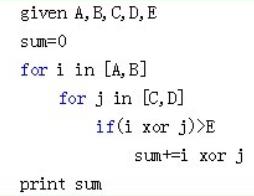FZU - 2042 The Mad Mathematician(数位dp)
Posted Frozen_Guardian
tags:
篇首语:本文由小常识网(cha138.com)小编为大家整理,主要介绍了FZU - 2042 The Mad Mathematician(数位dp)相关的知识,希望对你有一定的参考价值。
题目链接:点击查看
题目大意:给出
A
,
B
,
C
,
D
,
E
A,B,C,D,E
A,B,C,D,E,求
s
u
m
sum
sum

题目分析:数位dp,开五维维护一下状态即可,简单说一下
d
p
dp
dp 的状态:
d
p
[
p
o
s
]
[
x
>
=
A
]
[
x
<
=
B
]
[
y
>
=
C
]
[
y
<
=
D
]
[
x
o
r
>
E
]
dp[pos][x>=A][x<=B][y>=C][y<=D][xor>E]
dp[pos][x>=A][x<=B][y>=C][y<=D][xor>E]
如果是求方案数的话就非常简单了,但本题需要求贡献,实质上分成两种情况来讨论就可以做到不重不漏了:
- p o s + 1 pos+1 pos+1 位置之前异或和就大于 e e e
- 到 p o s + 1 pos+1 pos+1 位置为止异或和还等于 e e e, p o s pos pos 为止开始异或和大于 e e e
累计贡献是自上而下计算的,如果满足上面的情况一,只需要维护本位的贡献即可,如果满足了上面的情况二,则需要将最高位到 p o s + 1 pos+1 pos+1 的贡献也累加上才行
代码:
// #pragma GCC optimize(2)
// #pragma GCC optimize("Ofast","inline","-ffast-math")
// #pragma GCC target("avx,sse2,sse3,sse4,mmx")
#include<iostream>
#include<cstdio>
#include<string>
#include<ctime>
#include<cmath>
#include<cstring>
#include<algorithm>
#include<stack>
#include<climits>
#include<queue>
#include<map>
#include<set>
#include<sstream>
#include<cassert>
#include<bitset>
using namespace std;
typedef long long LL;
typedef unsigned long long ull;
template<typename T>
inline void read(T &x)
{
T f=1;x=0;
char ch=getchar();
while(0==isdigit(ch)){if(ch=='-')f=-1;ch=getchar();}
while(0!=isdigit(ch)) x=(x<<1)+(x<<3)+ch-'0',ch=getchar();
x*=f;
}
template<typename T>
inline void write(T x)
{
if(x<0){x=~(x-1);putchar('-');}
if(x>9)write(x/10);
putchar(x%10+'0');
}
const int inf=0x3f3f3f3f;
const int N=110;
const int mod=1e9+7;
int A[70],B[70],C[70],D[70],E[70];
LL dp[70][2][2][2][2][2];//dp[pos][x>=A][x<=B][y>=C][y<=D][x xor y >E]
LL a,b,c,d,e;
LL dfs(int pos,int f1,int f2,int f3,int f4,int f5,LL now) {
if(pos==-1) {
return 0;
}
if(dp[pos][f1][f2][f3][f4][f5]!=-1) {
return dp[pos][f1][f2][f3][f4][f5];
}
int downx=f1?A[pos]:0;
int upx=f2?B[pos]:1;
int downy=f3?C[pos]:0;
int upy=f4?D[pos]:1;
int downe=E[pos];
LL ans=0;
for(int i=downx;i<=upx;i++) {
for(int j=downy;j<=upy;j++) {
//前面卡住了xor,当前位小于e,不合法
if(!f5&&(i^j)<downe) {
continue;
}
//前面卡住了xor,下面可能合法,继续递归
ans=(ans+dfs(pos-1,f1&&i==downx,f2&&i==upx,f3&&j==downy,f4&&j==upy,f5||(i^j)>downe,now|((i^j)*(1LL<<pos))))%mod;
//统计贡献
LL dx=f1&&i==downx?((a&((1LL<<pos)-1)))%mod:0;
LL ux=f2&&i==upx?((b&((1LL<<pos)-1)))%mod:((1LL<<pos)-1)%mod;
LL dy=f3&&j==downy?((c&((1LL<<pos)-1)))%mod:0;
LL uy=f4&&j==upy?((d&((1LL<<pos)-1)))%mod:((1LL<<pos)-1)%mod;
LL x=(ux-dx+mod+1)%mod;
LL y=(uy-dy+mod+1)%mod;
if(f5) {//pos+1之前就大于了e
LL val=((i^j)*(1LL<<pos))%mod;
ans=(ans+val*x%mod*y%mod)%mod;
} else if(!f5&&(i^j)>downe) {//pos+1卡住了e,pos大于了e
LL val=((i^j)*(1LL<<pos)+now)%mod;
ans=(ans+val*x%mod*y%mod)%mod;
}
}
}
return dp[pos][f1][f2][f3][f4][f5]=ans;
}
LL solve(LL a,LL b,LL c,LL d,LL e) {
memset(dp,-1,sizeof(dp));
for(int i=0;i<=62;i++) {
A[i]=a&1;
a>>=1;
B[i]=b&1;
b>>=1;
C[i]=c&1;
c>>=1;
D[i]=d&1;
d>>=1;
E[i]=e&1;
e>>=1;
}
return dfs(62,1,1,1,1,0,0);
}
int main()
{
#ifndef ONLINE_JUDGE
// freopen("data.in.txt","r",stdin);
// freopen("data.out.txt","w",stdout);
#endif
// ios::sync_with_stdio(false);
int w;
cin>>w;
int kase=0;
while(w--) {
read(a),read(b),read(c),read(d),read(e);
printf("Case %d: %lld\\n",++kase,solve(a,b,c,d,e));
}
return 0;
}
以上是关于FZU - 2042 The Mad Mathematician(数位dp)的主要内容,如果未能解决你的问题,请参考以下文章
FZU 2216 The Longest Straight(最长直道)